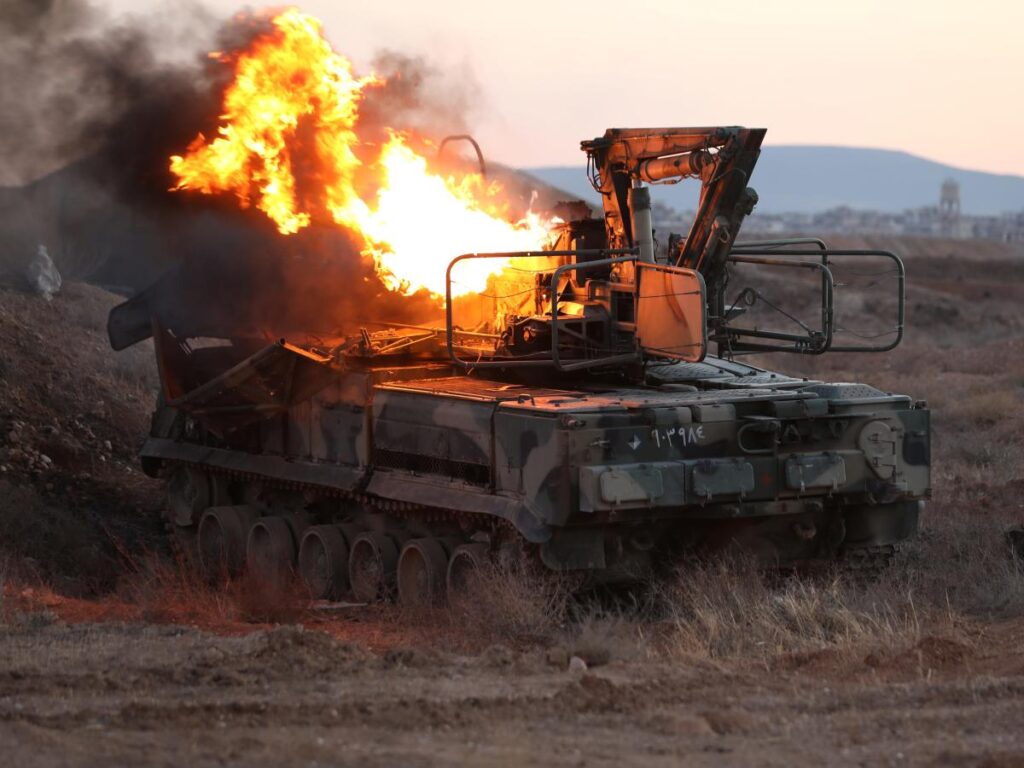In a decisive military operation, Israel launched extensive air and naval strikes against Syria, targeting remnants of the Assad regime’s military infrastructure after a significant rebel offensive successfully ousted President Bashar Assad. Over the course of approximately 48 hours, the Israeli Defense Forces (IDF) executed around 480 strikes, primarily utilizing warplanes and missile ships. This barrage aimed to dismantle Syrian military assets, including aircraft, naval vessels, ammunition depots, missile systems, and other strategic stockpiles that had been left vulnerable following the regime’s collapse. Israel’s swift and forceful actions reflect a calculated effort to prevent the Assad regime’s remaining capabilities from being exploited by extremist groups and potential adversaries, thereby enhancing its own security amid an evolving regional landscape.
With the fall of Assad marking a significant turning point in Syria’s prolonged conflict, rebel forces celebrated their victory by declaring Damascus free from the dictator. As Assad fled the capital, the political landscape began shifting, presenting opportunities for various factions. Former Prime Minister Ghazi al-Jalali indicated a readiness to work with any leadership emerging from the new situation. However, Israeli Prime Minister Benjamin Netanyahu warned that the fall of Assad does not necessarily equate to stability, as extremist factions like Hayat Tahrir al-Sham (HTS) might seize control. Despite acknowledging the lack of interference in Syria’s internal matters, Israel’s decisive military response aims to mitigate potential threats arising from a power vacuum in the country.
The operational strategy behind the extensive aerial bombardments is part of a broader mission known as Operation Bashan Arrow, which seeks to establish a “sterile defense zone” by neutralizing military threats stemming from Syria. Various key Syrian military installations, including Mezzeh Air Base in Damascus and the naval ports of Al-Bayda and Latakia, faced heavy bombardment, leading to substantial damage to Syrian naval and aerial capabilities. High-speed missile boats as well as military aircraft were specifically targeted, further crippling the Assad regime’s already diminished military strength. Israeli officials asserted that the attacks were necessary to ensure that unregulated military assets would not fall into the hands of jihadists or other hostile groups.
Furthermore, the strikes went beyond simply targeting military hardware and focused on dismantling critical components of Syria’s chemical weapons infrastructure. The Israeli military successfully destroyed facilities linked to the Syrian Scientific Studies and Research Center, which were believed to be involved in the development of chemical and biological weapons. This move underscores not only Israel’s immediate security concerns but also its long-term strategy to prevent the strengthening of the Assad regime and its allies, particularly Iran. By doing so, Israel aims to disrupt the regional influence of entities like Hezbollah and further solidify its position in an increasingly volatile Middle East.
The geopolitical ramifications of the collapse of the Assad regime have begun to emerge, with potential shifts in power dynamics across Syria and beyond. Netanyahu emphasized the significance of these military efforts, framing them as part of a broader campaign that has already begun altering the geopolitical landscape of the region. The IDF’s operations signal a commitment to maintaining a security zone free from heavy military assets, which could pose risks to Israeli interests. Although the Israeli military has indicated that it does not wish to interfere or engage in the internal Syrian conflict, its proactive measures reflect a determination to ensure security along its borders and counter any potential threats.
In summary, Israel’s recent military operations against Syrian targets represent a multifaceted approach to exploit the current instability following the ousting of Bashar Assad. The strategic air and naval strikes aimed not only to diminish the remnants of the Syrian military infrastructure but also to shape the future security dynamics in a region rife with conflict and uncertainty. With the fall of the Assad regime, Israel finds itself at a crossroads, navigating the delicate balance between immediate security concerns and the broader implications of a shifting power landscape. By engaging in these operations, Israel seeks to fortify its defenses and actively reshape its strategic environment in response to emerging threats from extremist factions and hostile neighboring forces.

